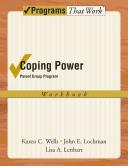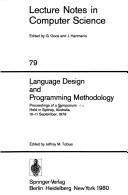| Listing 1 - 9 of 9 |
Sort by
|

ISBN: 1134849974 0585449198 0203425499 1280070927 1134849982 9780203425497 9786610070923 661007092X 9780415103725 041510372X 9780415103732 0415103738 9781134849987 9781134849932 1134849931 9781134849970 Year: 1994 Publisher: London ; New York : Routledge,
Abstract | Keywords | Export | Availability | Bookmark
 Loading...
Loading...Choose an application
- Reference Manager
- EndNote
- RefWorks (Direct export to RefWorks)
Gives a succinct and authoritative account of research into the nature and extent of bullying in schools, evaluating the success of different approaches to the problem.
School discipline --- Bullying --- Aggressiveness in children --- School psychology --- Psychology, School --- Psychology, Applied --- Aggressiveness (Child psychology) --- Aggressiveness (Psychology) in children --- Child psychology --- Conduct disorders in children --- Bullyism --- Aggressiveness
Book
ISBN: 3954896702 9783954896707 9783954891702 3954891700 Year: 2014 Publisher: Hamburg, Germany : Anchor Academic Publishing,
Abstract | Keywords | Export | Availability | Bookmark
 Loading...
Loading...Choose an application
- Reference Manager
- EndNote
- RefWorks (Direct export to RefWorks)
The primary objective for this study was to conduct an empirical investigation to gather information in the form of data from adolescent males and females in the Pretoria region of South Africa. Information was gathered with respects to their level of physical aggression, verbal aggression, anger, hostility and depression. The information was used to identify whether correlations exist between the three variables anger, aggression and depression for South African adolescents. Auszug aus dem Text What does the literature have to say? Introduction: Anger is the most
Aggressiveness --- Aggressiveness in children --- Teenage girls --- Aggressiveness (Child psychology) --- Aggressiveness (Psychology) in children --- Child psychology --- Conduct disorders in children --- Aggression (Psychology) --- Aggressive behavior --- Aggressiveness (Psychology) --- Psychology --- Defensiveness (Psychology) --- Fighting (Psychology) --- Toughness (Personality trait) --- Psychology. --- Treatment.
Book
ISBN: 019024206X 1281529192 9786611529192 0198043880 9780198043881 Year: 2008 Publisher: Oxford ; New York : Oxford University Press,
Abstract | Keywords | Export | Availability | Bookmark
 Loading...
Loading...Choose an application
- Reference Manager
- EndNote
- RefWorks (Direct export to RefWorks)
The Coping Power Program is designed for use with preadolescent and early adolescent aggressive children and their parents and is often delivered near the time of children's transition to middle school. Aggression is one of the most stable problem behaviors in childhood. If not dealt with effectively, it can lead to negative outcomes in adolescence such as drug and alcohol use, truancy and dropout, delinquency, and violence. This program has proven effective in helping to avoid these types of problems. The parent component of the program consists of 16 group meetings also held during the 5th a
Aggressiveness in children. --- Conduct disorders in children. --- Acting-out (Child psychiatry) --- Antisocial personality disorders in children --- CD (Child psychiatry) --- Child conduct disorders --- Disturbance of conduct (Child psychiatry) --- Misconduct (Child psychiatry) --- Behavior disorders in children --- Aggressiveness (Child psychology) --- Aggressiveness (Psychology) in children --- Child psychology --- Conduct disorders in children
Book
ISBN: 1616685727 9781616685720 9781607415831 1607415836 9781607415831 Year: 2009 Publisher: New York
Abstract | Keywords | Export | Availability | Bookmark
 Loading...
Loading...Choose an application
- Reference Manager
- EndNote
- RefWorks (Direct export to RefWorks)
Aggressiveness. --- Violence. --- Aggressiveness in children. --- Aggressive behavior in animals. --- Aggression in animals --- Aggressiveness in animals --- Animal aggression --- Animal aggressiveness --- Animals --- Aggressiveness --- Animal behavior --- Aggressiveness (Child psychology) --- Aggressiveness (Psychology) in children --- Child psychology --- Conduct disorders in children --- Violent behavior --- Social psychology --- Aggression (Psychology) --- Aggressive behavior --- Aggressiveness (Psychology) --- Psychology --- Defensiveness (Psychology) --- Fighting (Psychology) --- Toughness (Personality trait)
Book
ISBN: 3319530283 3319530275 Year: 2017 Publisher: Cham : Springer International Publishing : Imprint: Springer,
Abstract | Keywords | Export | Availability | Bookmark
 Loading...
Loading...Choose an application
- Reference Manager
- EndNote
- RefWorks (Direct export to RefWorks)
This compact resource synthesizes current research on bullying in the schools while presenting strengths-based approaches to curbing this growing epidemic. Its international review of cross-sectional and longitudinal studies unravels the complex dynamics of bullying and provides depth on the range of negative outcomes for bullies, victims, enablers, and victims who bully. Chapters on protective factors against bullying identify personal competencies, such as empathy development, and keys to a positive school environment, featuring findings on successful school-based prevention programs in different countries. Throughout, the authors clearly define bullying as a public health/mental health issue, and prevention as a deterrent for future antisocial and criminal behavior. Included in the coverage: · School bullying in different countries: prevalence, risk factors, and short-term outcomes. · Personal protective factors against bullying: emotional, social, and moral competencies. · Contextual protective factors against bullying: school-wide climate. · Protecting children through anti-bullying interventions. · Protecting bullies and victims from long-term undesirable outcomes. · Future directions for research, practice, and policy. With its wealth of answers to a global concern, Protecting Children against Bullying and Its Consequences is a definitive reference and idea book for the international community of scholars in criminology and developmental psychology interested in bullying and youth violence, as well as practitioners and policymakers. .
Bullying --- Aggressiveness in children. --- Prevention. --- Aggressiveness (Child psychology) --- Aggressiveness (Psychology) in children --- Psychology. --- Psychology --- Psychological measurement. --- Psychological Methods/Evaluation. --- General Psychology. --- Methodology. --- Child psychology --- Conduct disorders in children --- Psychological tests and testing. --- Philosophy (General). --- Psychology—Methodology. --- Behavioral sciences --- Mental philosophy --- Mind --- Science, Mental --- Human biology --- Philosophy --- Soul --- Mental health --- Measurement, Mental --- Measurement, Psychological --- Psychological measurement --- Psychological scaling --- Psychological statistics --- Psychometry (Psychophysics) --- Scaling, Psychological --- Psychological tests --- Scaling (Social sciences) --- Measurement --- Scaling --- Methodology --- Psychological Methods. --- Behavioral Sciences and Psychology.

ISBN: 9780080866864 0080866867 9780444879783 0444879781 1281788538 9786611788537 Year: 1986 Publisher: Amsterdam New York New York, N.Y., U.S.A. North-Holland Sole distributors for the U.S.A. and Canada, Elsevier Science Pub. Co.
Abstract | Keywords | Export | Availability | Bookmark
 Loading...
Loading...Choose an application
- Reference Manager
- EndNote
- RefWorks (Direct export to RefWorks)
Regional documentation --- United States --- Aggressiveness in children --- Television and children --- Violence on television --- Aggression --- Pediatrics --- Television --- Violence --- Assaultive Behavior --- Atrocities --- Behavior, Assaultive --- Interpersonal Violence --- Structural Violence --- Violent Crime --- Crime, Violent --- Interpersonal Violences --- Violence, Interpersonal --- Violence, Structural --- Violences, Interpersonal --- Violent Crimes --- Biological Warfare --- Riots --- Warfare --- Crime Victims --- Televisions --- Aggressions --- Television violence --- TV violence --- Violence in television --- Aggressiveness (Child psychology) --- Aggressiveness (Psychology) in children --- Child psychology --- Conduct disorders in children --- Violence on television. --- Aggressiveness in children.

ISBN: 0190275405 1281342181 9786611342180 0198043910 9780198043911 9781281342188 9780195327960 0195327969 9780190275402 6611342184 Year: 2008 Publisher: Oxford ; New York : Oxford University Press,
Abstract | Keywords | Export | Availability | Bookmark
 Loading...
Loading...Choose an application
- Reference Manager
- EndNote
- RefWorks (Direct export to RefWorks)
The Coping Power Program is designed for use with preadolescent and early adolescent aggressive children and their parents and is often delivered near the time of children's transition to middle school. Aggression is one of the most stable problem behaviors in childhood. If not dealt with effectively, it can lead to negative outcomes in adolescence such as drug and alcohol use, truancy and dropout, delinquency, and violence. This program has proven effective in helping to avoid these types of problems. The parent component of the program consists of 16 group meetings also held during the 5th a
Aggressiveness in children. --- Conduct disorders in children. --- Parenting. --- Parent and child. --- Child and parent --- Children and parents --- Parent-child relations --- Parents and children --- Children and adults --- Interpersonal relations --- Parental alienation syndrome --- Sandwich generation --- Parent behavior --- Parental behavior in humans --- Child rearing --- Parent and child --- Parenthood --- Acting-out (Child psychiatry) --- Antisocial personality disorders in children --- CD (Child psychiatry) --- Child conduct disorders --- Disturbance of conduct (Child psychiatry) --- Misconduct (Child psychiatry) --- Behavior disorders in children --- Aggressiveness (Child psychology) --- Aggressiveness (Psychology) in children --- Child psychology --- Conduct disorders in children
Book
ISBN: 0190242078 1281342173 9786611342173 0198043899 9780198043898 9781281342171 9780195327885 0195327888 9780195327878 019532787X 0190450002 Year: 2008 Publisher: New York ; Oxford : Oxford University Press,
Abstract | Keywords | Export | Availability | Bookmark
 Loading...
Loading...Choose an application
- Reference Manager
- EndNote
- RefWorks (Direct export to RefWorks)
The Coping Power Program is designed for use with preadolescent and early adolescent aggressive children and their parents and is often delivered near the time of children's transition to middle school. Aggression is one of the most stable problem behaviors in childhood. If not dealt with effectively, it can lead to negative outcomes in adolescence such as drug and alcohol use, truancy and dropout, delinquency, and violence. This program has proven effective in helping to avoid these types of problems. The parent component of the program consists of 16 group meetings also held during the 5th a
Aggressiveness in children. --- Conduct disorders in children. --- Aggressiveness in children --- Conduct disorders in children --- Behavioral Symptoms --- Family Relations --- Age Groups --- Behavior --- Socioenvironmental Therapy --- Social Behavior --- Persons --- Psychotherapy --- Family --- Behavior and Behavior Mechanisms --- Psychology, Social --- Named Groups --- Psychiatry and Psychology --- Behavioral Disciplines and Activities --- Psychotherapy, Group --- Parent-Child Relations --- Aggression --- Child --- Medicine --- Social Sciences --- Health & Biological Sciences --- Psychology --- Pediatrics --- Behavior And Behavior Mechanism --- Behavioral Symptom --- Symptom, Behavioral --- Symptoms, Behavioral --- Children --- Minors --- Aggressions --- Parent Child Relationship --- Parent-Child Relationship --- Parent-Offspring Interaction --- Interaction, Parent-Offspring --- Parent Child Relations --- Parent Child Relationships --- Parent Offspring Interaction --- Parent-Child Relation --- Parent-Child Relationships --- Parent-Offspring Interactions --- Relation, Parent-Child --- Relationship, Parent Child --- Relationship, Parent-Child --- Group Psychotherapy --- Therapy, Group --- Group Therapy --- Psychology, Perceptual --- Social Psychology --- Perceptual Psychology --- Extended Family --- Family Life Cycle --- Family Research --- Filiation --- Kinship Networks --- Relatives --- Family Life Cycles --- Family Members --- Family, Reconstituted --- Stepfamily --- Extended Families --- Families --- Families, Extended --- Families, Reconstituted --- Family Member --- Family, Extended --- Kinship Network --- Life Cycle, Family --- Life Cycles, Family --- Network, Kinship --- Networks, Kinship --- Reconstituted Families --- Reconstituted Family --- Research, Family --- Stepfamilies --- Grandparents --- Psychotherapies --- Neurolinguistic Programming --- Sensory Art Therapies --- Person --- Sociality --- Behavior, Social --- Behaviors, Social --- Social Behaviors --- Therapy, Socioenvironmental --- Socioenvironmental Therapies --- Therapies, Socioenvironmental --- Acceptance Process --- Acceptance Processes --- Behaviors --- Process, Acceptance --- Processes, Acceptance --- Age Group --- Group, Age --- Groups, Age --- Family Dynamics --- Family Relationships --- Family Relationship --- Dynamic, Family --- Dynamics, Family --- Family Dynamic --- Family Relation --- Relation, Family --- Relations, Family --- Relationship, Family --- Relationships, Family --- Acting-out (Child psychiatry) --- Antisocial personality disorders in children --- CD (Child psychiatry) --- Child conduct disorders --- Disturbance of conduct (Child psychiatry) --- Misconduct (Child psychiatry) --- Behavior disorders in children --- Aggressiveness (Child psychology) --- Aggressiveness (Psychology) in children --- Child psychology --- therapy

ISBN: 0387097430 0387097449 9786611953836 1281953830 0387097457 3540097457 3540385797 3540097430 3540385754 9783540097433 9783540097457 9780387097459 9780387097442 Year: 1980 Volume: 176 Publisher: Berlin : Springer-Verlag,
Abstract | Keywords | Export | Availability | Bookmark
 Loading...
Loading...Choose an application
- Reference Manager
- EndNote
- RefWorks (Direct export to RefWorks)
Antisocial acts by children and teens are on the rise – from verbal abuse to physical bullying to cyber-threats to weapons in schools. Strictly punitive responses to aggressive behavior may even escalate a situation, leaving peers, parents, and teachers feeling helpless. This unique volume conceptualizes aggression as a symptom of underlying behavioral and emotional problems and examines the psychology of perpetrators and the power dynamics that foster intentionally hurtful behavior in young people. It details for readers how bibliotherapy offers relevant, innovative, and flexible treatment – as a standalone intervention or as a preventive method in conjunction with other forms of treatment – and can be implemented with individuals and groups, parents, teachers, and even rivals. Treating Child and Adolescent Aggression Through Bibliotherapy: Offers research-based guidelines for treating aggression in children and adolescents. Provides an integrative approach to treating aggressive children and youth to more fully address the complex nature of antisocial behavior. Sets out a practical framework for bibliotherapy, choosing developmentally appropriate materials, identifying themes for discussion, matching selections to therapeutic progress, and more. Demonstrates individual and group bibliotherapy sessions with male and female children and adolescents. Includes a complete session-by-session prevention program for the classroom. Features an appendix of suggestions for effective therapeutic literature. This unique, must-have resource is essential reading for school psychologists, school counselors, social workers, and clinical child psychologists and any allied educational and mental health professionals who work with troubled youth.
Aggression -- Psychology. --- Aggressiveness in adolescence -- Treatment. --- Aggressiveness in children -- Treatment. --- Bibliotherapy for children. --- Bibliotherapy for teenagers. --- Aggressiveness in children --- Aggressiveness in adolescence --- Bibliotherapy for children --- Bibliotherapy for teenagers --- Psychology --- Bibliotherapy --- Aggression --- Adolescent --- Child --- Methods --- Behavioral Sciences --- Social Behavior --- Age Groups --- Investigative Techniques --- Behavioral Symptoms --- Rehabilitation --- Psychotherapy --- Behavioral Disciplines and Activities --- Behavior --- Analytical, Diagnostic and Therapeutic Techniques and Equipment --- Therapeutics --- Persons --- Behavior and Behavior Mechanisms --- Named Groups --- Psychiatry and Psychology --- Pediatrics --- Medicine --- Health & Biological Sciences --- Treatment --- Treatment. --- Aggressiveness (Psychology) in adolescence --- Aggressiveness (Child psychology) --- Aggressiveness (Psychology) in children --- Tools and techniques: decision tables flow charts modules and interfaces programmer workbench software libraries structured programming top-down programming user interfaces (Software engineering) --- language classifications: applicative languages data-flow languages design languages extensible languages macro and assembly languages nonprocedural languages specialized application and very high-level languages (Programminglanguages) --- Languages constructs: abstract data types concurrent programming structurescontrol structures coroutines (Programming languages) --- Process management: concurrency deadlocks multiprocessing/multiprogrammingmutual exclusion scheduling synchronization (Operating systems) --- 681.3*D33 Languages constructs: abstract data types concurrent programming structurescontrol structures coroutines (Programming languages) --- 681.3*D32 language classifications: applicative languages data-flow languages design languages extensible languages macro and assembly languages nonprocedural languages specialized application and very high-level languages (Programminglanguages) --- 681.3*D22 Tools and techniques: decision tables flow charts modules and interfaces programmer workbench software libraries structured programming top-down programming user interfaces (Software engineering) --- 681.3*D41 Process management: concurrency deadlocks multiprocessing/multiprogrammingmutual exclusion scheduling synchronization (Operating systems) --- Diminishing returns --- Multiplication, Complex. --- Psychology. --- Education. --- Social work. --- Clinical psychology. --- Psychotherapy. --- Counseling. --- Child psychology. --- School psychology. --- Personality. --- Social psychology. --- Clinical Psychology. --- Child and School Psychology. --- Education, general. --- Psychotherapy and Counseling. --- Social Work. --- Personality and Social Psychology. --- Programming --- 681.3*A0 --- 681.3*D22 --- 681.3*D32 --- 681.3*D33 --- 681.3*D41 --- 681.3*D33 Languages constructs: abstract data types; concurrent programming structures;control structures; coroutines (Programming languages) --- Languages constructs: abstract data types; concurrent programming structures;control structures; coroutines (Programming languages) --- 681.3*D32 language classifications: applicative languages; data-flow languages; design languages; extensible languages; macro and assembly languages; nonprocedural languages; specialized application and very high-level languages (Programminglanguages) --- language classifications: applicative languages; data-flow languages; design languages; extensible languages; macro and assembly languages; nonprocedural languages; specialized application and very high-level languages (Programminglanguages) --- 681.3*D22 Tools and techniques: decision tables; flow charts; modules and interfaces; programmer workbench; software libraries; structured programming; top-down programming; user interfaces (Software engineering) --- Tools and techniques: decision tables; flow charts; modules and interfaces; programmer workbench; software libraries; structured programming; top-down programming; user interfaces (Software engineering) --- 681.3*A0 General --- General --- 681.3*D41 Process management: concurrency; deadlocks; multiprocessing/multiprogramming;mutual exclusion; scheduling; synchronization (Operating systems) --- Process management: concurrency; deadlocks; multiprocessing/multiprogramming;mutual exclusion; scheduling; synchronization (Operating systems) --- Adolescent psychotherapy --- Child psychotherapy --- Adolescent psychology --- Child psychology --- Conduct disorders in children --- Curves, Elliptic. --- Programming languages (Electronic computers) --- Computer programming --- Langages de programmation --- Programmation (Informatique) --- Congresses --- Congrès --- Psychology, clinical. --- Developmental psychology. --- Applied psychology. --- Consciousness. --- Apperception --- Mind and body --- Perception --- Philosophy --- Spirit --- Self --- Benevolent institutions --- Philanthropy --- Relief stations (for the poor) --- Social service agencies --- Social welfare --- Social work --- Human services --- Applied psychology --- Psychagogy --- Psychology, Practical --- Social psychotechnics --- Development (Psychology) --- Developmental psychobiology --- Life cycle, Human --- Software engineering. --- Software Engineering. --- Computer software engineering --- Engineering --- Children --- Education, Primitive --- Education of children --- Human resource development --- Instruction --- Pedagogy --- Schooling --- Students --- Youth --- Civilization --- Learning and scholarship --- Mental discipline --- Schools --- Teaching --- Training --- Psychology, School --- Psychology, Applied --- Behavior, Child --- Child behavior --- Child study --- Pediatric psychology --- Child development --- Developmental psychology --- Psychiatry --- Psychological tests --- Mass psychology --- Psychology, Social --- Human ecology --- Social groups --- Sociology --- Personal identity --- Personality psychology --- Personality theory --- Personality traits --- Personology --- Traits, Personality --- Individuality --- Temperament --- Counselling --- Helping behavior --- Clinical sociology --- Interviewing --- Personal coaching --- Social case work --- Therapy (Psychotherapy) --- Mental illness --- Mental health counseling --- Education --- Logique --- Courbes elliptiques --- Nombres, Théorie des --- Langages de programmation.
| Listing 1 - 9 of 9 |
Sort by
|

 Search
Search Feedback
Feedback About
About Help
Help News
News